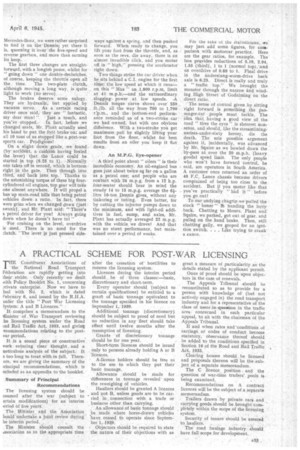A PRACTICAL SCHEME FOR POST-WAR LICENSING
Page 35

If you've noticed an error in this article please click here to report it so we can fix it.
THE Constituent Associations of • the. National Road Transport Federation are rapidly getting into their stride. Only recently we dealt with Policy. Booklet No.. 1, concerning arivate enterprise. Now we have to 'deal with No. 2, which is dated February S. and issued by the R.H.A. fader the title " Post War Licensing 3ystem: A and B Licences."
If comprises a memorandum to the qinister of .War Transport reviewing h e licensing system under the Road aid Rail Traffic Act, 1933, and giving ecoramendation,s relating to the postwar period.
It is a sound piece of constructive vork evincing clear thought, and a neticulous analysis of the subject. It s too long to treat with in full. Thereore,. we are giving the summary of the n-incipal recommendations, which is ncluded as an appendix to the booklet.
Summary of Principal Recommendations The licensing syetern should be esurned after the war (subject to ertain modifications) • for an interim
ieriod Of five-years. • ,
The Minister and the Association hOuld undertake a joiut review during . . , . he interim period. The Minister shonld consult the Lssociation as to the appropriate time after the cessation of hostilities to resume the licensing system.
Licences during the interim period should be of three classes:—basic, discretionary and short-term,
Every operator should (subject to certain qualifications) be entitled to a grant of basic tonnage equivalent to the tonnage specified in his licence on September 1, 1939.
Additional tonnage (discretionary) should be subject to proof of need but no reduction in any fleet should take effect until twelve months after the resumption of licensing.
Grants of discretionary tonnage should be for one year.
Short-term licences should be issued only to persons already holding A or B licences.
A-licence holders should be free as to the use to which they put their basic tonnage.
Allowance should be made for differences in tonnage revealed upon the reweighing Of vehicles.
Hauliers should be granted A licences
and not B, unless goods are to be care
ried in connection with a trade or business other than carrying, , An allowance of basic tonnage should be made where horse-drawn vehicles 'have ceased to operate since Septem ber 1,1939. , , Objectors should be required to state the nature of their objections with as great a measure of particularity as the details stated by the applicant permit. Onus of proof should be upon objectors in the case of renewals.
The Appeals Tribunal should be reconstituted so as to provide for a person with knowledge of (but not actively engaged in) the road transport industry and for a representative of the class of users in question in the traffic area concerned in each particular appeal, to sit with the chairman of the Appeals Tribunal.
If and when rates and conditionsof carriage or codes of conduct become statutory, observance thereof should be added to the conditions specified in Section 16 of the Road and Rail Traffic Act, 1933.
Clearing houses should be licensed and proposals thereon will be the subject of a separate memorandum.
The C licence position and the question of war-time traders' pools is being examined, • Recommendations on A contract licences will be the subject of a separate memorandum.
Trailers drawn by private cars and , carrying goods should be brought completely within the scope of the licensing system.
Security of tenure should be assured to hauliers. ,
The road haulage industry ,should have full scope for development.,




















































